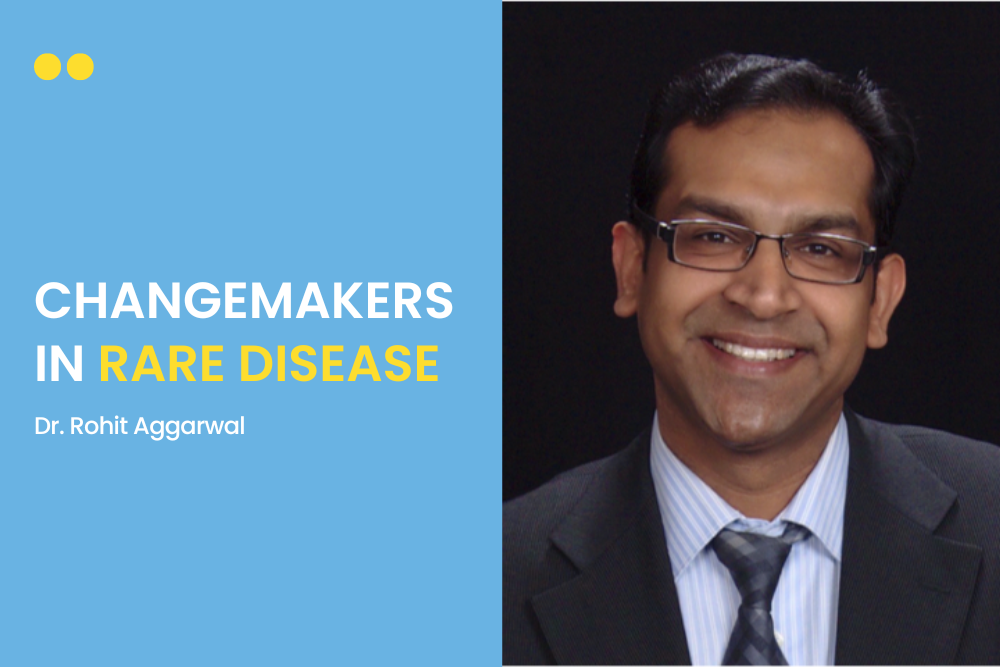Improving Access to Specialized Care For Myositis
To truly understand the intricacies of a rare disease, it takes a rare type of doctor. Get to know the specialists who are at the forefront of rare disease research with our series, Changemakers in Rare. Dr. Rohit Aggarwal is on a mission to connect more myositis patients to experts nationwide.
Rohit Aggarwal, MD, MS, Professor, Rheumatologist, Auto-Immune Disease Expert.
By Gina DeMillo Wagner
When it came time to choose a medical specialty, Rohit Aggarwal, MD, MS, had some criteria: “I was drawn to complex, multi-system diseases that affect multiple organs… and for which there are little or no treatment options,” he recalls. Put another way: “I was looking for a challenge,” he says. Those criteria led him to rheumatology and autoimmune disorders, and then specifically to myositis.
Myositis is a group of rare conditions that involve weakness in the muscles, sometimes with rashes. There are different types of myositis affecting different muscle groups, but they’re all usually caused by a problem in the immune system.
Early on, Dr. Aggarwal saw a need for more research and treatments for myositis patients. “It hasn’t been easy,” he notes. The rare nature of myositis meant that there wasn’t funding readily available. “There weren’t people lining up to donate to myositis research, and there weren’t foundations offering grants at the time,” he recalls. So, Dr. Aggarwal donated his time to research, often after long days of seeing patients at the University of Pittsburgh Medical Center. Eventually, he was able to secure funding to focus on research even more. His purpose was always clear: “How can I bring the maximum amount of help to the maximum number of patients?
Creating more centers of excellence for myositis
Dr. Aggarwal came to see that the greatest impact on patients comes from access to specialists. Typically, a patient’s journey starts with their primary care doctor, he says. That doctor might refer them to a first-level specialist, such as a rheumatologist or autoimmune expert. “But it’s hard for those patients to reach a second- or third-level specialist who focuses on their specific condition,” he says. To reach that level, he notes, you typically have to visit an academic research hospital or a center of excellence.
Dr. Aggarwal is currently working toward a goal of establishing at least 50 of those specialized centers across the nation to help myositis patients. And he’s doing it through multiple paths:
He’s established myositis fellowships to train new doctors in the specific mechanisms and treatment options for myositis conditions. Those fellows can then go on to open centers of excellence, often within hospitals or as part of rheumatology centers.
He’s also helping to build mentorship programs, connecting specialists with established centers of excellence and universities.
Clinical trials also offer a path to opening new centers of excellence, Dr. Aggarwal notes. Written into the trial protocols and plans is a consortium of myositis experts who are trained to know the study measures and assessments. Those experts then are able to treat myositis patients across the US.
Connecting more patients with myositis to clinical trials
Another goal Dr. Aggarwal has is to connect more patients to studies that could help them. “I’d love for more people to participate in clinical trials,” he says. Some patients have a misconception or fear that participating in studies makes them a guinea pig. But that couldn’t be farther from the truth, he says. “You actually get more attention and more care in a clinical trial than you do otherwise,” he explains.
Not to mention, there are several perks to participating in a trial. Participants are seen more often, enjoy more flexible scheduling, and are followed more closely than regular clinic patients, he notes. They receive free testing, free treatment, and they have exclusive access to a team of specialists.
As for those lingering fears: “Remember that by the time a treatment reaches a phase three clinical trial, it already has a lot of research and data behind it,” Dr. Aggarwal explains. “The doctors wouldn’t invest their time and money if they didn’t think the treatment would help you.”
And, if anything does go wrong, your doctor will be the first to speak up, he notes. “Your doctor is always on your side and has your best interest in mind. The doctor’s responsibility is to the patient, not the trial.” In most cases, he says, patients do so incredibly well in clinical studies that they don’t want to leave once the trial is complete. “People are reluctant to sign up, but then they never want to leave.”
Educating and empowering patients with Myositis
When patients first get a diagnosis, they usually start searching online for information about their condition. This is both a good and bad thing, cautions Dr. Aggarwal. There’s so much information available these days, that you need to be able to take a step back and consider the source and whether it’s reliable.
When in doubt, ask your doctor what resources and experts they’d recommend. “Many patients are reluctant to ask about other options, but they should.” Ask about studies or experts in your area studying your condition, he suggests. Don’t have an expert near you? Consider meeting with a specialist remotely via telehealth, or make a one-time trip for a consultation. “Even seeing a specialist for one visit or consult can make a big difference,” he says. That way, the specialist can collaborate with your usual doctor and help customize a treatment plan.
Finally, he recommends connecting with support groups, either in person or online. Finding social support and validation, and sharing tips can go a long way toward improving the quality of life for people living with rare diseases.
For more information on myositis, watch the series of videos Dr. Aggarwal created here. He also works to expand awareness about myositis on his Twitter account.
If you would like to learn more about the MINT study, please check out this useful webinar.































